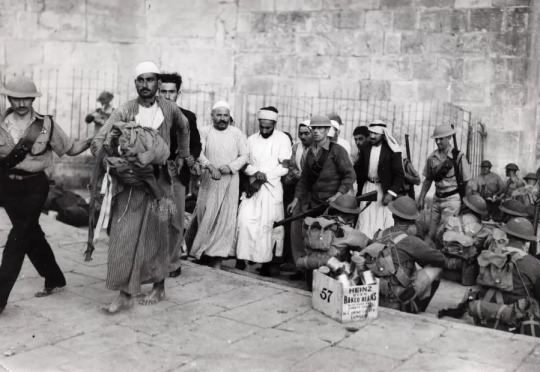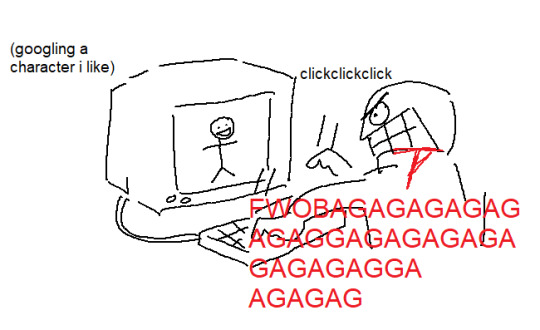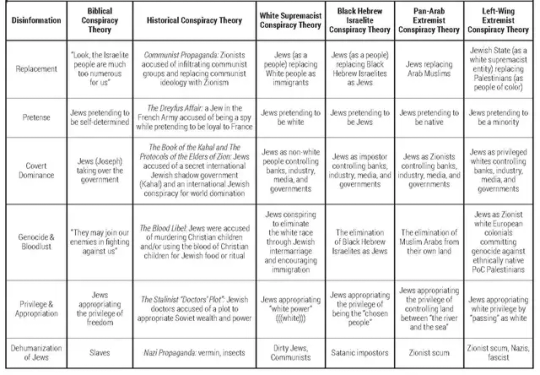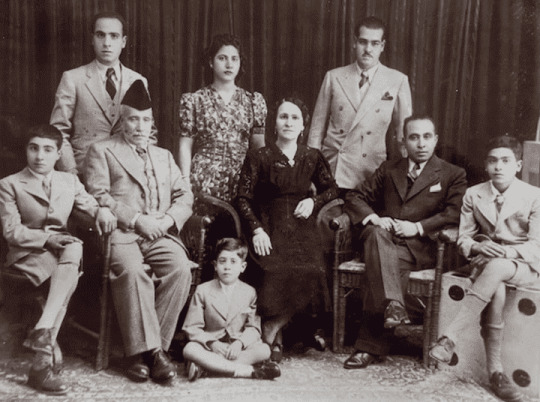#jewish virtual library
Text
document in question:
#reaux speaks#resources#tiktok#plan dalet#history#free palestine#zionism#anti zionism#palestine#jewish virtual library#genocide#ethnic cleansing#bipoc#undescribed
45 notes
·
View notes
Note
Hello! Can you recommend any overview/introductory resources on israel? I've been able to find some that are very critical of Israel, but I've found that a lot of the pro-Israel stuff is either entirely focused on the now (instead of giving an overview at least of the history) or assume a certain amount of background knowledge that I just don't have. Thank you!
One good book is "Israel, a History" by Martin Gilbert. It was published in 1998, so anything after that isn't covered. It's still over 700 dense pages, but it is a good history. I've read it. It's good. Another one that others have recommended is, "Israel, a Concise History," by Daniel Gordis. It was published in 2016, so it is more up to date. At only 560 pages, it's also shorter. I prefer books over the internet, but if you're looking for internet sources, check the Jewish Virtual Library website. https://www.jewishvirtuallibrary.org/modern-israel-and-the-diaspora-timeline-table-of-contents
6 notes
·
View notes
Text
The 613 Mitzvot (Commandments) from the Jewish Virtual Library
#The 613 Mitzvot (Commandments)#Jewish Virtual Library#Jewish Studies#Bookshelf#Tumblr Staff Has Ruined Links Now And I Hate Them For It
1 note
·
View note
Text
Israel antes del Estado: La Revuelta Árabe
En abril de 1936, estalló la violencia en Palestina. Seis líderes árabes prominentes dejaron de lado sus rivalidades y se unieron para protestar contra el avance sionista en Palestina, formando el Alto Comando Árabe, liderado por el Mufti Haj Amin al-Husseini. Este grupo representó los intereses árabes en Palestina hasta 1948.

El Alto Comando Árabe inició la protesta con un llamado a una huelga general de trabajadores árabes y un boicot a productos judíos, pero pronto la situación se tornó violenta, con ataques terroristas contra judíos y británicos. Esta primera fase de la "Revuelta Árabe" duró hasta noviembre de 1936. La segunda fase comenzó en septiembre de 1937, cuando la Comisión Peel recomendó la partición de Palestina, lo que intensificó los enfrentamientos con las fuerzas británicas y los ataques a asentamientos judíos.

El aumento de la inmigración judía y la adquisición de tierras, junto con la frustración árabe por el dominio europeo, llevó a una mayor radicalización de los palestinos. Durante esta revuelta, los británicos enfrentaron crecientes presiones, especialmente por la necesidad de mantener el acceso al petróleo en el Medio Oriente en preparación para la Segunda Guerra Mundial. El cambio en la política británica hacia la conciliación con los árabes culminó con la publicación del Libro Blanco de 1939, que limitó la inmigración judía y propuso una Palestina árabe independiente en 10 años. La revuelta resultó en una disminución significativa del compromiso británico con el movimiento sionista.
El Yishuv, la comunidad judía en Palestina, reforzó sus defensas durante la revuelta, mientras los británicos permitieron el armamento de la Haganah, una organización de defensa judía. La revuelta se sofocó con medidas duras y el cierre del Alto Comité Árabe, pero los árabes lograron concesiones políticas con el Libro Blanco. Sin embargo, el Yishuv continuó consolidando su presencia en Palestina, y el conflicto persistiría hasta la partición por la ONU, que daría lugar a nuevas tensiones y hostilidades.

#yishuv#jewish#israel#judaism#judaísmo#judío#cultura judía#world zionist organization#zionism#sionismo#palestine#palestina#gaza#arab revolt#judíos#1936#1939#migration#immigration#zionist#jerusalem#old city#balfour declaration#inmigración judía#inmigración#revolt#jewish virtual library
1 note
·
View note
Text
Jewish Virtual Library
Anything you need to know from Anti-Semitism to Zionism
1 note
·
View note
Text
Me, looking through books on Palestine: "Ilan Pappé wrote one called 'The Biggest Prison On Earth?!' People in Gaza hate it being called a prison. There's an entire hashtag for it. There's been an account dedicated to collecting pics and videos of #TheGazaYouDontSee for 6 years.
"Is Pappé even Palestinian? oh god wait I can tell already. this is gonna be an 'Israeli apologist' isn't it."
Internet: "Yeah, Pappé's Israeli."
Me: "For fuck's--- so people will believe Israelis unquestioningly if they're shit-talking Israel, but in all other situations, Israelis are all liars?"
Internet: "Pretty much. Also, at best, Ilan Pappé must be one of the world’s sloppiest historians."
Me, admittedly in full schadenfreude now: "What?!?!"
Internet: "Benny Morris. That historian who's extremely hard-core about primary source documentation, who wrote that detailed book about how and why each group of Palestinian refugees left in 1947-9. He reviewed three books about Palestine."
Me: "Holy shit. And the book by Pappé is about the Husaynis. The family that Nazi war criminal Amin al-Husseini came from, the guy who fucked absolutely everything up for both Israel and Palestine."
Internet: "That's the one. Morris wrote, 'At best, Ilan Pappe must be one of the world’s sloppiest historians; at worst, one of the most dishonest. In truth, he probably merits a place somewhere between the two.'"
Me: "Why??"
Internet: "He says, 'Here is a clear and typical example—in detail, which is where the devil resides—of Pappe’s handiwork. I take this example from The Ethnic Cleansing of Palestine'....
"Blah blah blah, basically in 1947 the UN voted to partition the land into Palestine and Israel, and extremist militias started shooting at Jewish towns and people. David Ben-Gurion was the leader of the Jewish community there, and his journal describes a visit from a scientist named Aharon Katzir, telling him about an experiment codenamed "Shimshon." Morris gives us the journal entry:
...An experiment was conducted on animals. The researchers were clothed in gas masks and suit. The suit costs 20 grush, the mask about 20 grush (all must be bought immediately). The operation [or experiment] went well. No animal died, the [animals] remained dazzled [as when a car’s headlights dazzle an oncoming driver] for 24 hours. There are some 50 kilos [of the gas]. [They] were moved to Tel Aviv. The [production] equipment is being moved here. On the laboratory level, some 20 kilos can be produced per day.
"Morris says, 'This is the only accessible source that exists, to the best of my knowledge, about the meeting and the gas experiment, and it is the sole source cited by Pappe for his description of the meeting and the "Shimshon" project. But this is how Pappe gives the passage in English:
Katzir reported to Ben-Gurion: 'We are experimenting with animals. Our researchers were wearing gas masks and adequate outfit. Good results. The animals did not die (they were just blinded). We can produce 20 kilos a day of this stuff.'
"'The translation is flecked with inaccuracies, but the outrage is in Pappe’s perversion of "dazzled," or sunveru, to "blinded"—in Hebrew "blinded" would be uvru, the verb not used by Ben-Gurion—coupled with the willful omission of the qualifier '"for 24 hours."'
"'Pappe’s version of this text is driven by something other than linguistic and historiographical accuracy. Published in English for the English-speaking world, where animal-lovers are legion and deliberately blinding animals would be regarded as a barbaric act, the passage, as published by Pappe, cannot fail to provoke a strong aversion to Ben-Gurion and to Israel.
"'Such distortions, large and small, characterize almost every page of The Ethnic Cleansing of Palestine. So I should add, to make the historical context perfectly clear, that no gas was ever used in the war of 1948 by any of the participants. [Or, he later notes, by either Israel or Palestine ever.] Pappe never tells the reader this.
"'Raising the subject of gas is historical irrelevance. But the paragraph will dangle in the reader’s imagination as a dark possibility, or worse, a dark reality: the Jews, gassed by the Nazis three years before, were about to gas, or were gassing, Arabs.'"
Me: "Uuuuggghhhhhhhhh. Yeah, it will."
Internet: "He does say, 'Palestinian Dynasty was a good idea.' Then he does some really detailed historian-dragging about the lack of primary sources and reliance on people's interpretations of what they say instead.
"'Almost all of Pappe’s references direct the reader to books and articles in English, Hebrew, and Arabic by other scholars, or to the memoirs of various Arab politicians, which are not the most reliable of sources. Occasionally there is a reference to an Arab or Western travelogue or genealogy, or to a diplomat’s memoir; but there is barely an allusion to documents in the relevant British, American, and Zionist/Israeli archives.
"'When referring to the content of American consular reports about Arab riots in the 1920s, for example, Pappe invariably directs the reader to an article in Hebrew by Gideon Biger—“The American Consulate in Jerusalem and the Events of 1920-1921,” in Cathedra, September 1988—and not to the documents themselves, which are easily accessible in the United States National Archive.
"'Those who falsify history routinely take the path of omission. They ignore crucial facts and important pieces of evidence while cherry-picking from the documentation to prove a case.
"'Those who falsify history routinely take the path of omission. They ignore crucial facts and important pieces of evidence while cherry-picking from the documentation to prove a case.
"'But Pappe is more brazen. He, too, often omits and ignores significant evidence, and he, too, alleges that a source tells us the opposite of what it in fact says, but he will also simply and straightforwardly falsify evidence.
"'Consider his handling of the Arab anti-Jewish riots of the 1920s.
"'Pappe writes of the “Nabi Musa” riots in April 1920: “The [British] Palin Commission... reported that the Jewish presence in the country was provoking the Arab population and was the cause of the riots.” He also quotes at length Musa Kazim al-Husayni, the clan’s leading notable at the time, to the effect that “it was not the [Arab] Hebronites who had started the riots but the Jews.”
"'But the (never published) [Palin Commission Report], while forthrightly anti-Zionist, thereby accurately reflecting the prevailing views in the British military government that ruled Palestine until mid-1920, flatly and strikingly charged the Arabs with responsibility for the bloodshed.
"'The team chaired by Major-General P.C. Palin wrote that “it is perfectly clear that with... few exceptions the Jews were the sufferers, and were, moreover, the victims of a peculiarly brutal and cowardly attack, the majority of the casualties being old men, women and children.” The inquiry pointed out that whereas 216 Jews were killed or injured, the British security forces and the Jews, in defending themselves or in retaliatory attacks, caused only twenty-five Arab casualties.'"
Me: "Yeah. I'm looking at that report right now and it says there had been an explosion, and then people were looting Jewish stores and beating Jews with stones, and in one case stabbing someone. Some people said that some Jews got up on the roof of a hotel and retaliated by throwing stones themselves.
"And then it literally says, 'The point as to the retaliation by Jews is of importance because it seems to have impressed the Military and led them to imagine that the Jews were to some extent responsible for provoking the rising.' That's the only thing it really says about anyone blaming the Jews.
"Except.... the very beginning gives some historical context. And it does say that when the Balfour Declaration came out, Muslims and Christians 'considered that they were to be handed over to an oppression which they hated far more than the Turk's and were aghast at the thought of this domination....
"'If this intensity of feeling proceeded merely from wounded pride of race and disappointment in political aspirations, it would be easier to criticise and rebuke: but it must be borne in mind that at the bottom of all is a deepseated fear of the Jew, both as a possible ruler and as an economic competitor. Rightly or wrongly they fear the Jew as a ruler, regarding his race as one of the most intolerant known to history....
"'The prospect of extensive Jewish immigration fills him with a panic fear, which may be exaggerated, but is none the less genuine. He sees the ablest race intellectually in the world, past-masters in all the arts of ousting competitors whether on the market, in the farm or the bureaucratic offices, backed by apparently inexhaustible funds given by their compatriots in all lands and possessed of powerful influence in the councils of the nations, prepared to enter the lists against him in every one of his normal occupations, backed by the one thing wanted to make them irresistible, the physical force of a great Imperial Power, and he feels himself overmastered and defeated before the contest is begun.'
"Wow! What a great fucking example of how 'positive' stereotypes are actually used to fuck people over! We're not antisemitic, we actually think Jews are the smartest, most powerful, richest group with tremendous global power! So positive!! Not at all being used here to justify antisemitic violence!
"Also, immigration from all over the world actually meant that different agricultural and manufacturing techniques were brought into the region, and yes, financial investments to start businesses sometimes, which meant that Arab Palestinians there had the highest per capita income in the Middle East, the highest daily wages, and started a lot of businesses of their own. But go off, I guess."
"Anyfuckingway.... it basically says that the Muslims and Christians were angry and scared, the Jews were too quick to set up the functioning government that the Brits were supposed to be there to help both sides create -- and which the Arab leaders completely refused to create for Palestine, because (1) fascists and (2) didn't want Jews nearby -- and that they were "ready prey for any form of agitation hostile to the British Government and the Jews." Then it says the movement for a United Syria was agitating them real hard, and so were the Sherifians.
"Is that what Ilan Passe, I mean Pappe, meant by the Palin Report blaming the Jews?! That when it says it's understandable the Arabs were freaking out, because antisemitism, Pappe thinks it's saying the Jews were provoking them?!"
Internet: "I don't know. I kinda tuned out after the first hour you were talking."
Me: "OGH MY GOD"
Internet: "So anyway, then Morris ALSO says, 'About the 1929 “Temple Mount” riots, which included two large-scale massacres of Jews, in Hebron and in Safed, Pappe writes: “The opposite camp, Zionist and British, was no less ruthless [than the Arabs]. In Jaffa a Jewish mob murdered seven Palestinians.”
Me: "What the ENTIRE FUCK? There was no united 'Zionist and British' camp! The Brits would barely let any Holocaust refugees in, ffs!"
Internet: "Morris says, 'Actually, there were no massacres of Arabs by Jews, though a number of Arabs were killed when Jews defended themselves or retaliated after Arab violence.
"'Pappe adds that the British “Shaw Commission,” so-called because it was chaired by Sir Walter Shaw (a former chief justice of the Straits Settlements), which investigated the riots, “upheld the basic Arab claim that Jewish provocations had caused the violent outbreak. ‘The principal cause... was twelve years of pro-Zionist [British] policy.’”
"'It is unclear what Pappe is quoting from. I did not find this sentence in the commission’s report. Pappe’s bibliography refers, under “Primary Sources,” simply to “The Shaw Commission.” The report? The deliberations? Memoranda by or about? Who can tell?
"'The footnote attached to the quote, presumably to give its source, says, simply, “Ibid.”
"'The one before it says, “Ibid., p. 103.”
"'The one before that says, “The Shaw Commission, session 46, p. 92.”
"'But the quoted passage does not appear on page 103 of the report.
"In the text of Palestinian Dynasty, Pappe states that “Shaw wrote [this] after leaving the country [Palestine].” But if it is not in the report, where did Shaw “write” it?'"
Me: "I'M ON IT. [rapid-fire googling] OMG. This is.... Not the first time. In 'The Ethnic Cleansing of Palestine,' he reported that in a 1937 letter to his son, David Ben-Gurion declared: 'The Arabs will have to go, but one needs an opportune moment for making it happen, such as war.'
"It's not in the source he gave. It's not in any of the three different sources he's given for it.
"He apparently has never responded to any requests for an explanation, either from the journal he published in, or from other historians. But it says he did "obliquely [acknowledge] the controversy in an article in Electronic Intifada, in which he portrayed himself as the victim of intimidation at the hands of “Zionist hooligans.”'
"This is absolutely fucking wild. THEN it says the chair of the Ethics Committee where he was teaching eventually said that the second part of the quote ('but one needs,' etc) was a (combined?) paraphrase of a diary entry and a speech Ben-Gurion gave, and that the first half is 'based on' a letter to his son.
"And it's so convincing! The chair says, 'Shabtai Teveth[,] Ben Gurion’s biographer, Benny Morris and the historian Nur Maslaha have all quoted this letter. In fact their translation was stronger than the quotation from Professor Pappé: ‘We must expel the Arabs and take their place.’ Professor Pappé has documentary evidence of these quotations and the source will ensure that this is correctly cited in any future editions of the publication or related studies.'
"And IT'S NOT EVEN TRUE?!
"Ben-Gurion's actual diary entry (not a letter) says the opposite.
“'We do not want and do not need to expel Arabs and take their places.... All our aspiration is built on the assumption – proven throughout all our activity – that there is enough room in the country for ourselves and the Arabs.'
"Benny Morris misquoted it as "We must expel the Arabs and take their places" in the English version of his 1987 book The Birth of the Palestinian Refugee Problem, although it was correct in the Hebrew version. He corrected himself in the 2001 book Righteous Victims.
"Teveth also misquoted it in the English version of his 1985 book Ben-Gurion and the Palestinian Arabs, but again, had it correct in the Hebrew edition.
"And both Morris and Teveth explicitly point out the rest of the entry. The part about all their aspiration being built on the assumption and experience that there was enough room in the country for everyone.
"Historian Efraim Karsh’s 1997 book Fabricating Israeli History pointed out and corrected their mistakes.
"This is apparently a very well-known issue among historians of Israel and Palestine. It was a big deal in 2003, when an evangelist Christian publisher put out a book FULL of disinformation, which not only used the same quote as Pappe does, but also could not give a real source for it.
"But Pappe STILL USED THE MISQUOTE AND DOUBLED DOWN ON IT EVERY SINGLE TIME."
Internet: "Are you done? I know all this already."
Me: "Also, there are literally only two places where the phrase 'twelve years of pro-Zionist policy' shows up online, and they're both about Pappe making quotes up.
"NOW I'm done."
Benny Morris wasn't, though. The review continues at the link below. And the next part starts, "To the deliberate slanting of history Pappe adds a profound ignorance of basic facts. Together these sins and deficiencies render his “histories” worthless as representations of the past, though they are important as documents in the current political and historiographic disputations about the Arab-Israeli conflict. Pappe’s grasp of the facts of World War I, for example, is weak in the extreme."
#i hate people misrepresenting history in general#i extra hate it when people do it with malice aforethought#ilan pappe#is a lying liar and people need to stop recommending his bullshit when it's been so thoroughly debunked#this is a good example of anti-Zionism being antisemitism tbh. I have yet to see anti-Zionist accounts of history that are accurate#like if you have to victim-blame people who were baked in ovens during an anti-Jewish riot you are PROBABLY in the wrong#I was looking for a piece explaining the 1920 and 1929 anti-Jewish riots that I could link here that wasn't from an explicitly Jewish sourc#because I don't trust people to take an article from the Jewish Virtual Library or whatever without being like “this is Zionist propaganda!#even if it's about an extremely violent massacre of Jews#so I clicked specifically on the Encyclopedia of the Palestine Question and similar sources#and what all of them did was gloss right over the massacres and violence and just vaguely mention “the demonstrations in 1920��#or not mention them at all of course#I guess that makes sense but wow. now I understand more of how ignorant people are about the entire history here#not only has it all been presented to you as “this started in 1947 or 48! the Jews stole all the land! it's been genocide ever since!”#so that people literally tell me “they invaded in 1947 and kicked out the Palestinians and took their land”#but also you have to fill in anything before that yourself#and the only propaganda you have access to usually is this myth that everyone was perfectly happy together until Israel... killed everyone?#it's really super weird to see people say that Jews and Muslims and Christians all lived happily together before this#like what do you think happened? everyone was happy and suddenly the jews were like “fuck you we're taking over and killing everyone?”#that probably is what people think happened tbh#they don't need for there to be any motivation or for that to make sense because they've bought the idea that it's just pure evil ig#for some reason people have to reverse-engineer hamas's massacre and imagine that israel did even worse to justify it#a terrorist group doesn't come out of nowhere! i don't think you know what terrorism is tbh#but they're happy to assume that whatever they think israel did came out of nowhere#god i'm fucking tired#anyway fuck ilan pappe#there are WAY BETTER HISTORIES OF PALESTINE#i've heard good things about Gaza: A History but of course that's not all of palestine#long post#such a long post
22 notes
·
View notes
Text









4 notes
·
View notes
Text
It will always astound me that zionists and zionist sympathizers just state things completely unsupported by facts. Like they deny don't cite a single fact other than "I just know" or the freaking Jewish Virtual Library which is a known antipalestinian and zionist resource. I can cite Avi Shlaim and Ilan pappe and other antizionist jews and Palestinian scholars and I can even literally point to Israeli state archives (because they document themselves pretty proudly committing crimes ACROSS swana) and then they just don't look. They just pretend they didn't see or they ignore it. Or they cite Wikipedia. Like no actually you cannot make assertions without supporting evidence and then pass it off as unadulterated fact. It frustrates me to no end the complete bastardization of fact and mixing it with Israeli talking points completely seriously.
5K notes
·
View notes
Text
On the Neturei Karta: Contextualizing criticism of an ultra-religious group
TL;DR: The Neturei Karta is a far-right ultra-orthodox religious Jewish group that is politically and religiously opposed to Zionism and is pro-Palestine. They believe in a strict interpretation of the Torah and are extremely socially conservative. They see Israel as dangerous for both Jews and Palestinians. Like most religious adherents to Abrahamic religions, they believe in end times where a messianic figure will come. Like most people who hold these beliefs, these long-term messianic beliefs are not central to their religion and do not impact their allyship or activism in any meaningful way (think 1000s of years hence, like Jesus returning in Islam, or in Christianity outside of groups who think this is immanent/connected to modern Israel).
Additionally, most orthodox Jews, including ultra-orthodox Jews, are pro-Israel or at least are not pro-Palestine. Most “non-Zionist ultra orthodox Jews” including the Satmar do not support Palestine.
Note: This summary is about anti Zionist ultra Orthodox Jewish groups in the USA. I don't know about all such groups in Jerusalem, but I do know NK has a presence there. I am not arguing that NK are progressive. They are not, but neither are many others across the world who support Palestine. Read this post and make up your own mind.
This post does not go into great detail about all the different types of Judaism or all the different streams of Zionism. Some info will inevitably be left out. I recommend learning more history yourself; the first few chapters of The Hundred Year’s War on Palestine are a great start. Avoid Zionist publications like Jewish Virtual Library.
I highly recommend this interview that Palestinian-ally activist Miko Peled does with NK Rabbi David Feldman: https://www.youtube.com/watch?v=cSd_eZ5qcbo&t=32s
Miko is an excellent narrator, and this is one of his best yet.
Brief history of the NK
The Neturei Karta is an ultra-orthodox Jewish group that opposes the state of Israel and actively works against it and supports Palestine. This is different from non-Zionist ultra orthodox Jews who disagree with Israel from a religious perspective, but are still willing to support it politically. The NK believe only the Messiah can establish a Jewish state in Palestine (as an eschatological belief; not a political one), but they do not believe in an enforced Jewish majority at any time.
Their website, NKUSA.org is best accessed through the Wayback Machine, as many of their pages are currently under construction: https://web.archive.org/web/20090228203457/http://www.nkusa.org/aboutus/index.cfm
Instructions for those unfamiliar with the Wayback Machine: https://help.archive.org/help/using-the-wayback-machine/
Summary of NK beliefs re: Zionism
The Neturei Karta believe that no Jewish state should exist in Palestine without the coming of the Messiah. They believe this so strongly that they actively oppose the state’s existence and engage in Palestine solidarity work.
The Neturei Karta also argue that no ultra-orthodox Jew believes in religious Zionism, often citing the lack of Israeli flags in ultra orthodox neighborhoods. This neglects the many ultra-orthodox Jews who support Israeli politically but not religiously.
Such still-politically-Zionist Jews will refer to the state of Israel as “Eretz Yisroel” rather than “Israel” thus acknowledging the land but not the political state’s significance. They will engage in pro-Israel politics, but do not see the Nakba (1948) or Naksa (1967) as religious events. This does not mean that everyone who uses the phrase “eretz yisroel” is secretly a Zionist.
See Yated’s website: this is an ultra-orthodox publication that heavily supports Israel even if they do not believe the state is religiously legitimate. However, politically they are Zionist as in they support Israel.
Glossary
Orthodox Judaism
Orthodox Jews believe in the divine origin of the Torah, given to Moses at Sinai. They are more strict about dietary laws, laws of family purity, and laws of the sabbath than more liberal or progressive Jews (such as Conservative/Masorti, Reform, Reconstructionist, etc.--all beyond the scope of this post)
Ultra Orthodox/haredi (very broad strokes)
Orthodox Jews who believe in a strict interpretation of the Torah and are more insulated from the larger world, including the Jewish world. They often dress differently and are even stricter about dietary laws, and are more socially conservative than the Modern Orthodox (women often don’t attend synagogue, adhere to very strict rules of modesty, arranged marriages, etc.)
Within the ultra orthodox world, there are hasidic (charismatic, such as Satmar or Chabad, usually following a dynasty, often from Eastern Europe) and non-hasidic groups (everyone else, including haredi sephardim and the Neturei Karta.) The Neturei Karta are not hasidic.
Many ultra-orthodox groups, including the Neturei Karta, would be considered high-demand religious groups (cults). Given how strict they are, I don’t think this is an unfair characterization. I note this because liberal zionists use the NK’s religious stringencies as a means of discrediting their allyship to Palestine. Bad faith, but still worth noting.
Political Zionism:
This is the belief that Jews should establish a Jewish-majority state in Palestine. Popularized by Herzl’s Der Judenstaadt. Plenty of Zionists support Israel without it being a pillar of religious belief for them, but:
Religious Zionism:
This is the belief that the modern nation state of Israel is part of the fulfillment of religious prophecy (you find both Jews and Christians believing this). There are plenty of ultra-orthodox religious Zionists, although ultra-orthodox non-zionists/anti-zionists will claim that these groups should not call themselves “ultra-orthodox.”
Non-Zionist: 2 definitions in the Orthodox world
Ultra-orthodox Jews may describe themselves as not Zionist to other religious Jews to differentiate themselves from religious Zionists. They may still support Israel, just not as a part of their religious faith, or they may oppose it but not be pro-Palestine (see the Satmar Hasidim.) You will probably not run into this on Tumblr or in progressive/pro-Palestine spaces--please don’t use this as an excuse to make anti-Zionist Jews “prove themselves”--you won’t run into these people on Tumblr or at pro-Palestine actions. “Non-zionist” may mean “anti-zionist in all but name” in non-orthodox Jewish spaces.
When I speak about ultra-orthodox religious Jews describing themselves as not Zionist in religious Jewish spaces, this refers only to their interactions with other Jews. If you are not Jewish and someone describes themselves as anti-Zionist to you, you should assume it means they are pro-Palestine unless they make it clear they believe otherwise.
The Satmar (religiously but not politically anti zionist ultra-orthodox hasidic Jews) formally denounced the NK in 1967 (note: the NK were never Satmar, nor were they hasidic at all–this is simply a religiously antizionist sect distancing themselves from those who are both religiously and politically antizionist.)


https://x.com/HQSatmar/status/1744693660787040553
Some orthodox Jews are genuinely politically anti-Zionist. Examples include Rabbi Yaakov Shapiro, the Neturei Karta, and plenty of individuals although not many institutions.
More info on ultra-orthodox Jews and zionism at this Pew Research page (I don’t think Pew is great at surveying American Jews, but this particular page on haredim in Israel is interesting): https://www.pewresearch.org/religion/2016/03/08/views-of-the-jewish-state-and-the-diaspora/
This article: https://forward.com/opinion/411615/think-all-orthodox-jews-are-zionists-think-again/
To any Jew, especially someone who knows the orthodox world, there are many over-simplifications here. The purpose of this post is to talk about the Neturei Karta, so I’m glossing over a lot of the intricacies. You’re welcome to fight about “Is Chabad Ultra-Orthodox” in the comments.
Issues of social conservatism (homophobia, misogyny, etc.)
Neturei Karta’s social conservatism
As with virtually all ultra-orthodox Jews, the Neturei Karta are extremely socially conservative. They believe that men and women have distinct roles (thus you never see any women with the NK at protests) and that homosexuality is evil. Women are required to raise children, cannot become rabbis, and have to dress extremely modestly. If you’ve ever seen the documentary “Trembling Before God,” a documentary on LGBT orthodox Jews, the rabbis at the beginning protesting against homosexuality are the Neturei Karta. Again, no women present.
I should note that the Neturei Karta are no more conservative than other ultra-orthodox Jews (and the Modern Orthodox Jewish world has been moving rightward for decades). But many liberal Jews will defend orthodox Judaism, even when it comes to denying children basic education and healthcare. You see this on Tumblr constantly. Orthodox Jews do terrible things and are defended by other Jews because “they’re more visible” and (some) Jews are convinced that any public criticism of orthodoxy will harm Judaism as a whole by making very damaging parts of it look bad.
But these liberal Zionist Jews will never defend the Neturei Karta. Their criticisms of homophobia and misogyny in this particular orthodox group are done in bad faith when they insist (for example) that women and LGBT people are perfectly fine within orthodox spaces. This is false.
TL;DR: Social conservatism is huge in orthodox Judaism. The Neturei Karta are not unique in this.
US Muslim social conservatism
I should note here that most US Muslims and Muslim institutions are socially conservative. (In a similar way to Jewish anti-zionism, there are some smaller openly pro-LGBT Muslim communities, but they are not supported by the larger US Muslim establishment.) Before the Bush era, most American Muslims and Arab Americans were staunch Republicans, supporting free markets and opposing LGBT rights, including LGBT-inclusive curricula in schools: https://newrepublic.com/article/168180/growing-religious-alliance-ban-lgbtq-books
To any liberals reading this in shock, here’s a post detailing how Palestinian American Imam Omar Suleiman is homophobic: https://www.instagram.com/reel/C1f7Do7gZei/
Many US and Canadian Muslim leaders can be found alongside conservative Christians protesting against LGBT education in schools, drag queen storytimes, and trans healthcare. Most recently, many Muslim leaders signed a homophobic/transphobic statement “Islam and the LGBT Question: Reframing the Narrative” earlier in 2023: https://www.instagram.com/p/Cs9lFR0AcG_/?igsh=bnJubGVodDAxczJz
This is similar to the Nashville Statement against homosexuality from many Christian leaders, or the Torah Declaration on Homosexuality in favor of conversion therapy from Jewish leaders. Muslims are not uniquely homophobic, but it’s important that progressives are aware of anti-LGBT prejudice in Jewish and Muslim communities in order to be good allies to queer Jews and Muslims. Omar Suleiman and the NK are not uniquely homophobic–they are emblematic of institutional prejudice within their respective religious communities. Homophobia/transphobia are not an excuse for genocide.
TL;DR for this section: Supporting Palestine does not make someone socially progressive.
Why aren't there more liberal Jewish anti Zionist rabbis speaking at pro Palestine rallies? Why give the microphone to the NK?
Many rallies do have anti Zionist progressive Jews speak. But they are usually lay people who do not represent Jewish religious groups. They may be independent, or from JVP or other similar groups (IJV Canada, etc), which will show up to pro Palestine actions even if they don't have a speaking slot. More notes on JVP here: https://bringmemyrocks.tumblr.com/post/736264435582238720/i-will-gladly-say-free-palestine-from-the-river-to
It's basically impossible to become a progressive Jewish rabbi as an anti-Zionist. All non-orthodox rabbinical schools that follow the traditional ordination process (5 years of education culminating with ordination, rather than an in-service further education program for those already serving as rabbis) require the candidate to be at least politically pro-Israel if not religious Zionist. All such programs require students to spend a year studying in Israel (generally in Jerusalem, although plenty of Orthodox institutions include a year of study in illegal settlements like Gush Etzion, Bat Ayin, etc.) If an anti-Zionist wants to become a rabbi outside of the NK or other ultra-orthodox institutions, they need to be willing to spend that year in Israel and hold their tongue re: Zionism until they are ordained. That's why so many liberal anti-Zionist rabbis have stories of leaving Zionism–they couldn't have been ordained if they'd left Zionism beforehand.
There are several synagogues in the USA that are friendly to anti-Zionist progressive Jews. However, these synagogues are not usually openly anti Zionist (with a few exceptions) and thus can/do still rely on mainstream Jewish sources of funding, whether individuals or their local JCRC (Jewish Community Relations Council). Synagogue councils can also threaten rabbis who speak out and can easily get them fired. Synagogue boards/councils/membership have the authority to fire the rabbi–the rabbi does not own the synagogue. I know several anti Zionist Jewish rabbis with largely anti-Zionist congregations who would still lose everything if they spoke at a pro Palestine rally. Rabbis in this position tend to speak at candlelight vigils rather than at rallies where people are chanting “intifada” (although their congregants often do!) A lot of it comes down to keeping the community in existence *or* letting the world know how anti Zionist they are.
Tzedek Chicago is the exception because of the amount of money they were able to raise–they still don't have their own building, and need to pay for spaces they use. Outside of a tiny pop-up minyan that can fit in someone’s house, saying of a community “this community should be willing to lose everything” isn't reasonable–they would have to shutter completely if they were 100% anti Zionist, not to mention the attacks the rabbis and congregants would get--Tzedek Chicago keeps its online services very secure to keep congregants safe.
Notes on Jewish eschatology and bad faith arguments:
With the exception of religious zionism (see people trying to build the third temple right now), Judaism as a religion is not overly concerned with eschatology (the end of the world). Jews may pray for the coming of the Messiah, but the religion itself is not overly concerned with the Messiah and the end times.
The Neturei Karta, as with many orthodox groups that don’t adhere to religious zionism, believe that when the Messiah comes, he will rebuild the Temple in Jerusalem. Some believe this to be on the same site as Al-Aqsa; some do not. The Neturei Karta believe that the land of Israel (biblically, eretz yisroel) will at some point become governed by Judaism with a third temple built, although they emphasize that Palestinians will stay in the land and everyone will live together peacefully. Again, this is eschatology. It’s not unusual for it to be vague, especially in the Jewish tradition, and nobody is preparing for it immediately.
I was actually inspired to make this post because someone posted this Vashti Magazine article "Neturei Karta are not your Allies" as a gotcha, even though the interview itself clearly shows that the Neturei Karta support Palestine even into their end-times prophecies…I’m not surprised most of the interview wasn’t published. If you look at what the rabbi said versus what the writer claims he said, it’s not even a bad interview. The writer herself notes that these prophecies are vague--I’ll give her the benefit of the doubt that she doesn’t know that much about religious Judaism. A lot of secular Jews are unfamiliar with those who believe in the Torah’s divine origins. This includes activists who support Palestine.
I regard this as a bad faith accusation because this has no bearing on current events. It is no different from Christians or Muslims who believe someday the entire world will be Christian/Muslim. I’m usually the last person to cry Christian-normativity, but plenty of religious people have end-times beliefs that have very little impact on their theology or their politics. This is not analogous to John Hagee the Christian Zionist with his end-times beliefs.
The Palestinian activists and allies I’ve spoken to about this agree with this. One was asked during a Q and A that I attended “what do you think about the Neturei Karta’s belief that in the end times the third temple will be rebuilt?” He responded “we’ll deal with that when the Jewish Messiah comes.” Because it’s an end-times prophecy that they believe they have no control over, not a political position that impacts their allyship. And anyone who isn’t a religious Jew doesn’t believe it will ever happen anyway.
It also bears mentioning that most people who bring up this particular point are themselves liberal Zionists trying to paint anti-Zionist orthodox Jews as actually worse allies to Palestinians than liberal Zionists because of vague beliefs they hold that will never crystalize (unless you are an orthodox Jew yourself). Vashti Magazine’s use of the phrase “Israel-Palestine” leads me to believe this is their motive as well. Thus my accusation of bad faith, particularly when the NK has shown up for Palestine protests for decades.
Accusations of Holocaust denial
The Neturei Karta has met with some less than Jew-friendly individuals throughout their history in the hopes that this will help curb worldwide antisemitism. This gets thrown around a lot by liberal zionists intent on making themselves look better. In 2006, some members of the Neturei Karta met with Iranian president Ahmedenijad. This meeting is often used to accuse them of Holocaust denial, even though the rabbi in question, Dovid Weiss, specifically named the Holocaust re: reasons he doesn’t support Israel.
"The Zionists use the Holocaust issue to their benefit. We, Jews who perished in the Holocaust, do not use it to advance our interests. We stress that there are hundreds of thousands Jews around the world who identify with our opposition to the Zionist ideology and who feel that Zionism is not Jewish, but a political agenda."
The same is true for their attendance at the International Conference to Review the Global Vision of the Holocaust; they strongly believe the Holocaust happened and made sure all attendees were aware. There were Holocaust deniers in attendance, but this conference was not a “Holocaust denial conference” although I’m not going to defend it. One could argue that these particular Neturei Karta members should not have attended such a conference, but they never engaged in Holocaust denial and actively fought against it. Source: https://web.archive.org/web/20070328235234/https://www.nkusa.org/activities/speeches/2006iran-weissspeech.cfm
If you’ve ever heard the Neturei Karta speak, you’d know they don’t deny the Holocaust. They bring it up constantly.
If you don’t like all of the Neturei Karta’s positions, that’s fine. This post is not supposed to make you like them, but rather to explain and contextualize things you may have heard about them.
431 notes
·
View notes
Text

Reminder! Antisemitic conspiracy theories are insidious! Here's a good reference from the Jewish Virtual Library to help you spot whether or not antisemitic conspiracy theories are influencing your rhetoric.
^source
#special emphasis on the use of the word zionist here#but my goyim homies are actually killing it this afternoon#thank you and i love you#antisemitism#leftist antisemitism#i'm seeing growth from the left!#hell yeah!#conspiracy theories
268 notes
·
View notes
Text
Jewish Resources (Assorted)
Since my last post seemed to be helpful to a lot of people, I thought I’d make another to share some additional resources. This list includes a bunch of stuff, meant for Jewish people in general. I would definitely encourage you to explore them! There’s a lot of useful stuff here.
Goyim are welcome to reblog, just please be respectful if you’re adding tags or comments.
Jewish Multiracial Network, an organization for multiracial Jewish families and Jews of Color
Sefaria, a free virtual library of Jewish texts
Sephardic Studies Digital Library Museum “The SSDC includes key books, archival documents, and audio recordings that illuminate the history, culture, literature, politics, customs, music, and cuisine of Sephardic Jews all expressed in their own language, Ladino.” (from their website)
The SMQN, an organization for LGBTQ+ Sephardic and Mizrahi Jews
Keshet, a group for LGBTQ+ Jews
JQY, a group for LGBTQ+ Jews with a focus on those in Orthodox communities
Queer Jews of Color Resource List (note: this list is way more than just resources, there’s a LOT there)
JQ International: “JQ celebrates the lives of LGBTQ+ Jews and their allies by transforming Jewish communities and ensuring inclusion through community building, educational programs, and support and wellness services, promoting the healthy integration of LGBTQ+ and Jewish identities.” (from their website)
Jews of Color Initiative, an organization dedicated to teaching about intersectionality in the Jewish community, focuses on research, philanthropy, field building, and community education
Nonbinary Hebrew Project: It’s hard to describe, but they’re working to find/create/add suffixes that represent nonbinary genders in Hebrew. If you speak Hebrew/another gendered language, you might know what I mean about gendered suffixes.
Jewish Mysticism Reading List (These are related to our closed practices, goyim should NOT be practicing these things)
Ritualwell (you can find prayers and blessings related to specific things here, I personally like that they have blessings related to gender identity)
Guimel, an LGBTQ+ support group for the Jewish Community in Mexico. The site is in Spanish. I’m not a native speaker, but I was still able to read a little bit of it.
SVARA: “SVARA’s mission is to empower queer and trans people to expand Torah and tradition through the spiritual practice of Talmud study.” (From their website)
TransTorah is definitely an older website, but there are still some miscellaneous pdfs and resources up on the “Resources” page.
Jewish Disabilities Advocates: “The JFS Jewish Disabilities Advocates program was created to raise awareness and further inclusion of people with disabilities within Jewish organizations and the larger Jewish community.” (from their website)
Jewish Food Society (recipes, have not spent a lot of time browsing here but maybe I should in the future)
Jewish Blind & Disabled, an organization that operates mainly in providing accessible housing and living.
Jewish Braille Institute International: “The JBI Library provides individuals who are blind, visually impaired, physically handicapped or reading disabled with books, magazines and special publications of Jewish and general interest in Audio, Large Print and Braille formats.” (from their website) Their services are free!)
#jumblr#jewish resources#jewish#lgbtq resources#disability resources#jews of color resources#jewish bipoc resources#judaism#jewblr#jewish community#sephardic#mizrahim#nonbinary jews#jews of color#lgbtq jews#trans jews#disabled jews#multiracial jews#sephardi jewish#sephardi#mizrahi jewish#mizrahim jewish#mizrahi
2K notes
·
View notes
Text
#Brachot (Blessings) Before Eating#Jewish Virtual Library#Jewish Studies#Prayer & Adoration#Bookshelf#Tumblr Staff Has Ruined Links Now And I Hate Them For It
0 notes
Text
Who are the Mizrahim? History 101
Where do Jews come from and what is the difference between Sephardim and Mizrahim? Loolwa Khazzoom gives this succint explanation for the Jewish Virtual Library:

A Baghdadi Jewish family
Regardless of where Jews lived most recently, therefore, all Jews have roots in the Middle East and North Africa. Some communities, of course, have more recent ties to this region: Mizrahim and Sephardim, two distinct communities that are often confused with one another.
Mizrahim are Jews who never left the Middle East and North Africa since the beginnings of the Jewish people 4,000 years ago. In 586 B.C.E., the Babylonian Empire (ancient Iraq) conquered Yehudah (Judah), the southern region of ancient Israel.
Babylonians occupied the Land of Israel and exiled the Yehudim (Judeans, or Jews), as captives into Babylon. Some 50 years later, the Persian Empire (ancient Iran) conquered the Babylonian Empire and allowed the Jews to return home to the land of Israel. But, offered freedom under Persian rule and daunted by the task of rebuilding a society that lay in ruins, most Jews remained in Babylon. Over the next millennia, some Jews remained in today’s Iraq and Iran, and some migrated to neighboring lands in the region (including today’s Syria, Yemen, and Egypt), or emigrated to lands in Central and East Asia (including India, China, and Afghanistan).
Sephardim are among the descendants of the line of Jews who chose to return and rebuild Israel after the Persian Empire conquered the Babylonian Empire. About half a millennium later, the Roman Empireconquered ancient Israel for the second time, massacring most of the nation and taking the bulk of the remainder as slaves to Rome. Once the Roman Empire crumbled, descendants of these captives migrated throughout the European continent. Many settled in Spain (Sepharad) and Portugal, where they thrived until the Spanish Inquisition and Expulsion of 1492 and the Portuguese Inquisition and Expulsion shortly thereafter.
During these periods, Jews living in Christian countries faced discrimination and hardship. Some Jews who fled persecution in Europe settled throughout the Mediterranean regions of the Ottoman (Turkish) Empire, as well as Central and South America. Sephardim who fled to Ottoman-ruled Middle Eastern and North African countries merged with the Mizrahim, whose families had been living in the region for thousands of years.
In the early 20th century, severe violence against Jews forced communities throughout the Middle Eastern region to flee once again, arriving as refugees predominantly in Israel, France, the United Kingdom, and the Americas. In Israel, Middle Eastern and North African Jews were the majority of the Jewish population for decades, with numbers as high as 70 percent of the Jewish population, until the mass Russian immigration of the 1990s. Mizrahi Jews are now half of the Jewish population in Israel.
Throughout the rest of the world, Mizrahi Jews have a strong presence in metropolitan areas — Paris, London, Montreal, Los Angeles, Brooklyn, and Mexico City. Mizrahim and Sephardim share more than common history from the past five centuries. Mizrahi and Sephardic religious leaders traditionally have stressed hesed (compassion) over humra (severity, or strictness), following a more lenient interpretation of Jewish law.
Despite such baseline commonalities, Middle Eastern and North African Mizrahim and Sephardim do retain distinct cultural traditions. Though Mizrahi and Sephardic prayer books are close in form and content, for example, they are not identical. Mizrahi prayers are usually sung in quarter tones, whereas Sephardic prayers have more of a Southern European feel. Traditionally, moreover, Sephardic prayers are often accompanied by a Western-style choir in the synagogue.
Mizrahim traditionally spoke Judeo-Arabic — a language blending Hebrew and a local Arabic dialect. While a number of Sephardim in the Middle East and North Africa learned and spoke this language, they also spoke Ladino–a blend of Hebrew and Spanish. Having had no history in Spain or Portugal, Mizrahim generally did not speak Ladino.
In certain areas, where the Sephardic immigration was weak, Sephardim assimilated into the predominantly Mizrahi communities, taking on all Mizrahi traditions and retaining just a hint of Sephardic heritage — such as Spanish-sounding names. In countries such as Morocco, however, Spanish and Portuguese Jews came in droves, and the Sephardic community set up its own synagogues and schools, remaining separate from the Mizrahi community.
Even within the Mizrahi and Sephardi communities, there were cultural differences from country to country. On Purim, Iraqi Jews had strolling musicians going from house to house and entertaining families (comparable to Christmas caroling), whereas Egyptian Jews closed off the Jewish quarter for a full-day festival (comparable to Mardi Gras). On Shabbat, Moroccan Jews prepared hamin (spicy meat stew), whereas Yemenite Jews prepared showeah (spicy roasted meat), among other foods.
Read article in full
The post Who are the Mizrahim? History 101 appeared first on Point of No Return.
Read in browser »
72 notes
·
View notes
Text
This example, of course, represents virtually the outer line, but even for those who continued to think of themselves as Jewish, German culture was the only valid culture. All that remained from Judaism were some ritualistic hangovers (such as a trip to the synagogue on Yom Kippur) and biblical monotheism. The exemplars of wisdom were no longer Moses or Solomon, but rather Lessing and Goethe, Schiller and Kant. Schiller in particular was truly venerated: his Complete Works were required in the library of every self-respecting German or Austrian Jew (when my parents left Vienna in 1935, they took their copy with them). In Germany, the most resolute assimilationist current was the Central-Verein deutscher Staatsbürger jüdischen Glaubens [Central Association of German Citizens of Jewish Denomination]. Describing this social milieu (to which his own family belonged), Gershom Scholem noted:
"Education and readings were oriented exclusively to Germany, and in the majority of cases, any dissidence, notably in the direction of a return to Judaism, was met with decided opposition. Assimilation ran very deep. Each time, they emphasized over and over, albeit with slight differences, that we belonged to the German nation, at the center of which we formed a religious group, like the others. What was even more paradoxical was that in the majority of the cases, the religious element – which was the only difference – did not exist nor did it exert any influence over how they conducted their lives."
None the less, it would be wrong to regard this thirst for cultural integration as mere opportunism: it could also express sincere and authentic convictions. Even as profoundly religious a Jew as Franz Rosenzweig wrote in 1923, shortly after the publication of his great theological work, Der Stern der Erlösung (The Star of Redemption):
"I believe that my return to Judaism (Verjüdung) made me a better and not a worse German… And I believe that Der Stern will one day be duly recognized and appreciated as a gift that the German mind owes to its Jewish enclave."
Assimilation was successful to a certain degree, but it came up against an insurmountable social barrier. According to Moritz Goldstein’s famous lament of unfulfilled love, which he wrote in 1912 (‘Deutsch-Jüdischer Parnass’), "in vain we think of ourselves as Germans; others think of us as completely un-German [undeutsch]… But were we not raised on German legends? Does not the Germanic forest live within us, can we too not see its elves and its gnomes?"
Assimilation also came up against de facto exclusion from a series of areas: State administration, the armed forces, the magistrature, education – and after 1890 in particular, against growing anti-Semitism, which had its ideologues, activists and press. For all of these reasons, the Jewish communities in Central Europe did not truly integrate into the surrounding society.
–Michael Löwy, Redemption and Utopia: Jewish Libertarian Thought in Central Europe
58 notes
·
View notes
Note
Do the Pashtun people of Afghanistan and Pakistan have Jewish ancestry?
The Pashtuns, now Afghanistan’s majority ethnic group and heavily involved in the establishment of the Taliban, sometimes call themselves "Bani Israel" and have a tribal legend which states that a Jewish group settled near the modern town of Herat and later converted to Islam after their leader met with Prophet Mohammed. Jewish Virtual Library writes that some Pashtuns have Jewish sounding names such as Asheri, Binyamin and Naftali, and that they practice Jewish customs such as marrying under a chuppah, lighting candles on fridays and circumcising their sons eight days after birth. This could also be explained through the Pashtuns’ connection with Jewish warriors, merchants, and administrative officers who traveled and settled on the Silk Road and left their influence on the local residents — but it is certainly intriguing.
The Assyrians conquered the kingdom of Israel some 2,730 years ago, scattering 10 of the 12 tribes into exile, supposedly beyond the mythical Sambation river. The two remaining tribes, Benjamin and Judah, became the modern-day Jewish people, and the search for the lost tribes has continued ever since. Some have claimed to have found traces of them in modern day China, Burma, Nigeria, India, Central Asia and Ethiopia. But it is believed that the tribes were dispersed in an area around modern-day northern Iraq and Afghanistan, which makes the Pashtun connection the strongest.
However, an Israeli government-funded DNA test found no genetic link between Jews and Pashtuns. They seem to share a greater affinity with Central Asian populations such as Tajiks or Turkmens, as well as with some Iranian and Caucasian groups. Whatever might be true, most Pashtuns today are strict Muslims with their own language and culture and have no interest in reconnecting with these assumed Jewish roots.
63 notes
·
View notes
Text
I have so many ideas for a creative project that I don't know where to start, like my brain keeps coming up with ideas and concepts and stops halfway when it gets to actually writing it down and trying, so....
PLEASE HELP ME CHOOSE WHAT PROJECT TO WORK ON 🙏
I will start to actively work on whatever wins the poll, and will constantly update every weekend on my blog, I can't promise any quality or fast progression, some of these are projects in areas I have 0 experience in, so just vote for whatever you think sounds the most interesting ig, but please vote so I'll have something to do!
I don't have a preference for any of these, that's why I'm asking tumblr!
no results option, choose something, please I have no idea what to do
if any of these sound interesting or confusing, there are explanations under the cut:
~•°•~.~•°•~.~•°•~
JEWISH MINECRAFT
either a client side mod or a plugin for Minecraft server that add Jewish elements to the game, main concept I have thought of:
kashrut laws, the mod will keep track of the kashrut of you, your tools, and your food (meat/dairy/parveh/non-kosher). for example: your sword starts as kosher parveh. you kill a cow - your sword is now kosher for meat and you have a kosher raw meat. you then kill a pig with the sword, your sword is now not kosher and you have a non-kosher raw pig meat. you then kill a cow with the sword, you have a non-kosher raw meat. you cook and eat the kosher meat, you get a kosher(meat) status for 3 in-game hours, you then drink a bucket of milk, the status changes to not-kosher. idk how to make your tools kosher again yet.
a tracker of in-game Minecraft days, whenever it gets to the evening of every 6/7 days (friday evening), Shabbat will start, indicated by some sort of pop-up. using any of your tools on shabbat will turn them non-kosher, villager trading will either be turned off or there will be a warning not to trade with them, and same thing with every working station + crafting table. building and breaking blocks with your hands is allowed, so will crafting from your inventory (unless it's food), farming will cause the resulting crops to not be kosher. Shabbat will end at nightfall of the 7th day.
my experience: Ive never made a Minecraft mod before, but I have experience programming in Java, so it can't be that hard to to at least some of these.
TIME LOOP GAME
a mystery game where you relive the same day over and over again, with no information saved between runs except the player's understanding of the world. the goal is to find out what causes the time loop and break it. loosly inspired by kindergarten, undertale, and a certain b movie that I don't know the name of.
I don't know how to explain the visuals I'm imagining, but it will be a mostly 2d plane you walk on, and interacting with NPCs will open a virtual novel type screen.
you'll have a "clock" at the top left corner, each action during the day will cost a certain amount of time (a few minutes to a few hours), the game will be balanced to give plenty of rooms for mistakes as to not make it stressful, and since every time loop is the exact same, making a mistake will only send you to the start of the day, where you can attempt the same thing again. (and if there are repetitive aspects like idk mini games there would probably be an option to skip them if you already completed it in a previous loop, that's the only thing the game will keep track of ig)
there's only so much you can do it one day, and certain things will require the player to possess information from previous loops, and so runs will differ and evolve as time goes on, there will also be bonus "routes" to learn more about the world and the characters in it.
idk what the mystery is yet! the story is very early stages.
my experience: I have no fucking clue how to use unity, I made a flappy bird and a platformer without levels, but I still haven't fogured out how OOP works with this thing, andy brain can't figure out how tf you make stuff like dialogue. it would probably take me a long time to make a working prototype.
UNDERTALE TIME LOOP FANGAME
this is THE EXACT SAME PROJECT AS THE ABOVE ONE, but as an Undertale fangame instead of an original story. and I do have a concept for this one!
you play as Frisk in the pacifist ending (NOT after a genocide route, pure pacifist with potentially multiple neutrals) (also not as the player controlling Frisk), living out your happy ending. it's been a few years, you've grown, humanity mostly accepted monsters, and the underground is mostly abandoned as monsters moved to the surface. You've lost your powers a long time ago, not that anyone knows about them, and you have no reason to use them again anyway, you have everything you've ever wanted. but one thing is missing: Flowey.
his determination has been deteriorating over the past few months, and it's gotten harder and harder for him to move. he started spending all his time at Chara's grave in the underground, and you visit him once in a while.
the game is during his final day, you find out, the last bits of determination leave his body and he turns back into a regular flower. but you're determined to save him, and so, your powers return, and you're able to go back in time to the start of the day, and start reliving it over and over, looking for a way to save him. a happy ending means for everyone.
it might be a bit more story heavy, it might even have Frisk being an actual character as they're free from the player's control, but it's the same concept and same mechanics.
my experience: same limitations as making an original game, but I also don't know how good I'd be at keeping the characters in-character for this.
ROTTMNT AU COMIC
this is a project I've already started on my shared tmnt sideblog with @remitiras. it only has 1 post! 😭
I have the second part halfway done on my computer, but I didn't like the writing for parts of it and couldn't find the motivation to properly rewrite it yet, so it's been on hiatus for 4-5 months.
I made the concept while having a hyperfixation on rottmnt, and Cass Apocalyptic Series specifically. since then I've moved on and I'm not as invested in the fandom or the story, but it's still something I wanna finish someday. it has a mostly finished outline, and a large collection of plot ideas, it's one of my most detailed creative projects to date! this would be a good practice for making comics and stories.
my experience: again, it already has a chapter, although pretty ugly in hindsight, the wip second chapter has a much better panel layout. I've never made a real comic before, but me and reminhave a pretty good grasp of the rottmnt characters and they're kinda helping me write it.
CARTOON CONCEPT FROM WHEN I WAS 12
despite having the idea for 8 years, I can't for the life of me decide on a name for it. lmao. the concept is as follows:
do you know these stories where the main character is living a normal and sad life until they find out their word actually has some sort of magic and an entire society of magic people living (mostly) in secret from regular humans? Harry Potter, Percy Jackson, Gravity Falls, Danny Phantom, Fairly OddParents, I can't think of any other examples rn. these usually (but not always) accompany a chosen one plot of the regular person finding out or growing to be the savior of the group.
now what if, multiple of these stories happened at the same time, in the same world, to all of your best friends?
that's the concept of my story! in it, the main character, Sapphire, moves to a new small town, and slowly finds out each one of her new friends are the main character of their own magical/paranormal journey.
I have uploaded some concept art to my blog already: one, two, three.
if this win, I will not make it into a full fledged indie cartoon bye myself (lol)
rather, I will write down all of my ideas and make more concept art, for characters and scenes. and will share it on my blog.
my experience: this is mostly just writing down preexisting ideas I never had time to write before, and drawing concepts I didn't have the motivation for. so I have the experience for this.
COMIC OF CHARACTER TRAPPED IN A MAGICAL LIBRARY
this is a comic I planned for practice! it's a comedy with simple colors and backgrounds so it's prerfect for practicing my comedy skills and writing episodic one-shot content. this time it has a name!
Endless Library:
the character wakes up to find herself in a library, but the bookshelves strech on to the horison and the books seem to be about the most random and wild things ever. there's no exit in sight. join in as she slowly goes insane and starts consuming the paper for substance, I swear it's not a horror story!
I already have 2.5 episodes drawn, it's a very simplified artstyle, and the background is super simple, it really got me to experiment with perspective. I keep picking it up for a week or so once every few months and I haven't touched it in almost a year, so I don't really remember more than the general plot. it will probably have ~100 short episodes? I still didn't figure out the ending.
my experience: I got a lot of indifferent to good reactions to my first chapter! so this will probably be the easiest to finish as long as I have the motivation, I also don't have to worry about experience with comics because the style is super simple.
PERSONAL PROJECTS
projects that won't be able to be shared with othwrs online :( they're fun and all but I'd just feel like they'll be a waste of time. these include:
making a hub on a new Minecraft server I joined, including multiple farms and a shared storage system. It just started so I still haven't logged in.
finishing my base on another Minecraft server, I like it hut I'm 50% of the active players.
making cute coasters for my apartment, and prettifying my apartment in general.
writing cringe low-effort fanfics for my eyes only, I will never ever share them sorry
drawing regular fanart
choosing one doesn't mean I won't do the others at all! it's just what I should focus on during my limited free time. right now I'm at a point where I can't focus on any project at all because I feel guilty ignoring the others.
also if you actually read all of this I'm sending you virtual hugs, thank you so much for actually taking interest in my unhinged ramblings 💗✨
15 notes
·
View notes